习语 俗语翻译 practice on idioms(2009)
- 格式:doc
- 大小:23.00 KB
- 文档页数:2
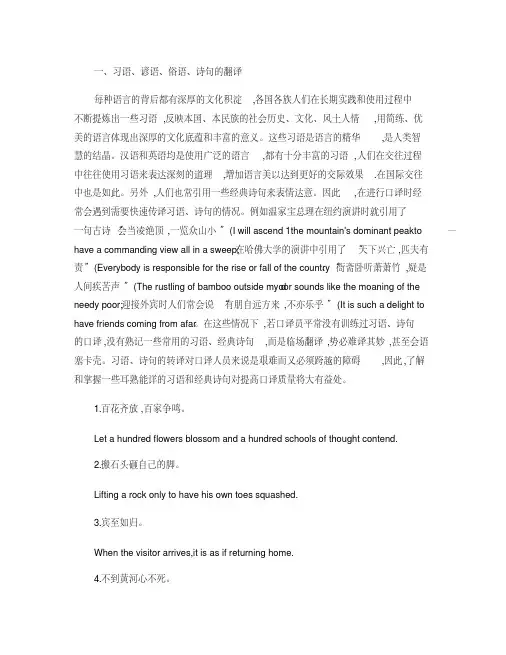
一、习语、谚语、俗语、诗句的翻译每种语言的背后都有深厚的文化积淀,各国各族人们在长期实践和使用过程中不断提炼出一些习语,反映本国、本民族的社会历史、文化、风土人情,用简练、优美的语言体现出深厚的文化底蕴和丰富的意义。
这些习语是语言的精华,是人类智慧的结晶。
汉语和英语均是使用广泛的语言,都有十分丰富的习语,人们在交往过程中往往使用习语来表达深刻的道理,增加语言美以达到更好的交际效果.在国际交往中也是如此。
另外,人们也常引用一些经典诗句来表情达意。
因此,在进行口译时经常会遇到需要快速传译习语、诗句的情况。
例如温家宝总理在纽约演讲时就引用了to一句古诗“会当凌绝顶,一览众山小”(I will ascend 1the mountain's dominant peak—have a commanding view all in a sweep;在哈佛大学的演讲中引用了“天下兴亡,匹夫有责”(Everybody is responsible for the rise or fall of the country、“衙斋卧听萧萧竹,疑是人间疾苦声”(The rustling of bamboo outside my d oor sounds like the moaning of theneedy poor;迎接外宾时人们常会说“有朋自远方来,不亦乐乎”(It is such a delight tohave friends coming from afar。
在这些情况下,若口译员平常没有训练过习语、诗句的口译,没有熟记一些常用的习语、经典诗句,而是临场翻译,势必难译其妙,甚至会语塞卡壳。
习语、诗句的转译对口译人员来说是艰难而又必须跨越的障碍,因此,了解和掌握一些耳熟能详的习语和经典诗句对提高口译质量将大有益处。
1.百花齐放,百家争鸣。
Let a hundred flowers blossom and a hundred schools of thought contend.2.搬石头砸自己的脚。
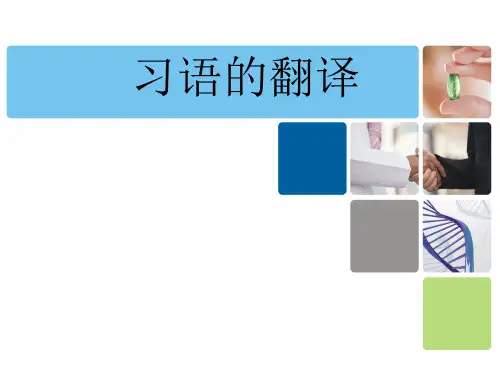
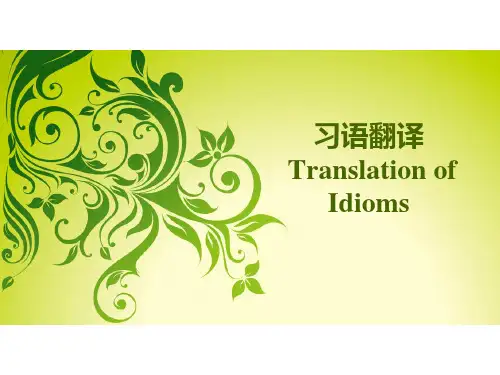
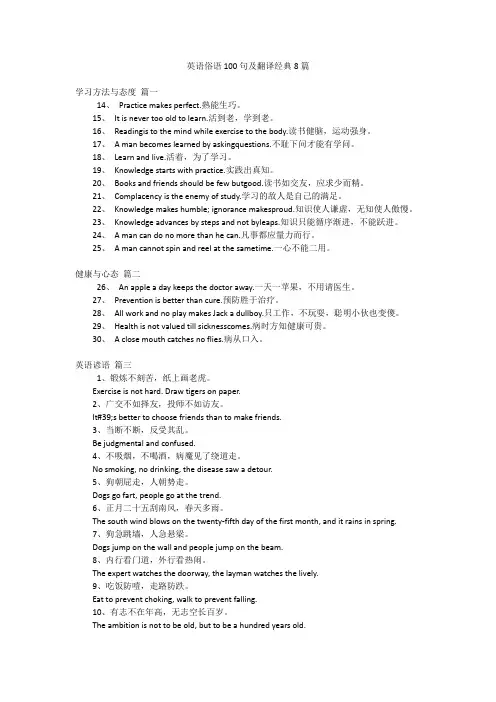
英语俗语100句及翻译经典8篇学习方法与态度篇一14、Practice makes perfect.熟能生巧。
15、It is never too old to learn.活到老,学到老。
16、Readingis to the mind while exercise to the body.读书健脑,运动强身。
17、A man becomes learned by askingquestions.不耻下问才能有学问。
18、Learn and live.活着,为了学习。
19、Knowledge starts with practice.实践出真知。
20、Books and friends should be few butgood.读书如交友,应求少而精。
21、Complacency is the enemy of study.学习的敌人是自己的满足。
22、Knowledge makes humble; ignorance makesproud.知识使人谦虚,无知使人傲慢。
23、Knowledge advances by steps and not byleaps.知识只能循序渐进,不能跃进。
24、A man can do no more than he can.凡事都应量力而行。
25、A man cannot spin and reel at the sametime.一心不能二用。
健康与心态篇二26、An apple a day keeps the doctor away.一天一苹果,不用请医生。
27、Prevention is better than cure.预防胜于治疗。
28、All work and no play makes Jack a dullboy.只工作,不玩耍,聪明小伙也变傻。
29、Health is not valued till sicknesscomes.病时方知健康可贵。
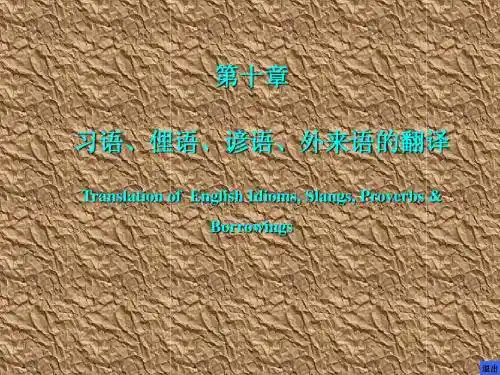
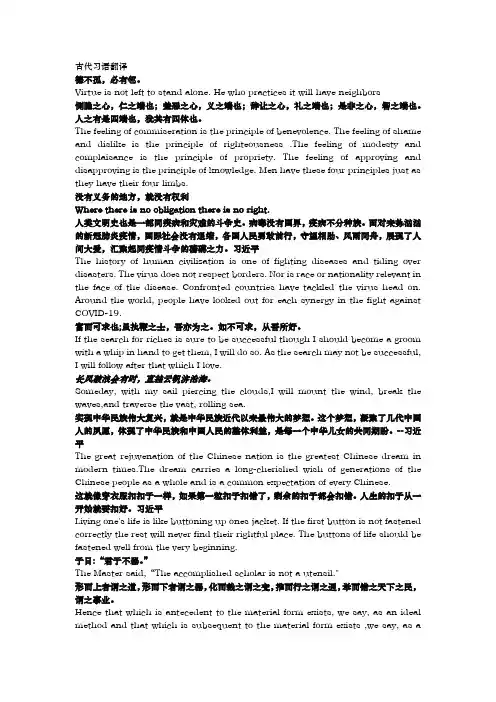
古代习语翻译德不孤,必有邻。
Virtue is not left to stand alone. He who practices it will have neighbors恻隐之心,仁之端也;羞恶之心,义之端也;辞让之心,礼之端也;是非之心,智之端也。
人之有是四端也,犹其有四体也。
The feeling of commiseration is the principle of benevolence. The feeling of shame and dislike is the principle of righteousness .The feeling of modesty and complaisance is the principle of propriety. The feeling of approving and disapproving is the principle of knowledge. Men have these four principles just as they have their four limbs.没有义务的地方,就没有权利Where there is no obligation there is no right.人类文明史也是一部同疾病和灾难的斗争史。
病毒没有国界,疫病不分种族。
面对来势汹汹的新冠肺炎疫情,国际社会没有退缩,各国人民勇敢前行,守望相助、风雨同舟,展现了人间大爱,汇聚起同疫情斗争的磅礴之力。
习近平The history of human civilization is one of fighting diseases and tiding over disasters. The virus does not respect borders. Nor is race or nationality relevant in the face of the disease. Confronted countries have tackled the virus head on. Around the world, people have looked out for each synergy in the fight against COVID-19.富而可求也;虽执鞭之士,吾亦为之。
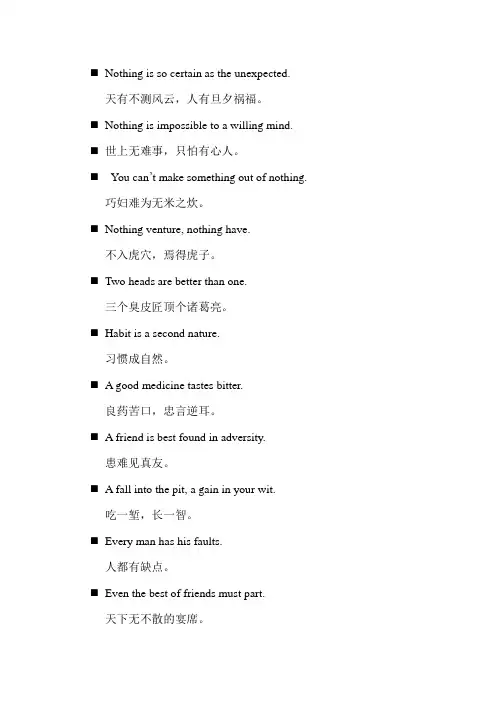
⏹Nothing is so certain as the unexpected.天有不测风云,人有旦夕祸福。
⏹Nothing is impossible to a willing mind. ⏹世上无难事,只怕有心人。
⏹You can’t make something out of nothing.巧妇难为无米之炊。
⏹Nothing venture, nothing have.不入虎穴,焉得虎子。
⏹Two heads are better than one.三个臭皮匠顶个诸葛亮。
⏹Habit is a second nature.习惯成自然。
⏹A good medicine tastes bitter.良药苦口,忠言逆耳。
⏹A friend is best found in adversity.患难见真友。
⏹A fall into the pit, a gain in your wit.吃一堑,长一智。
⏹Every man has his faults.人都有缺点。
⏹Even the best of friends must part.天下无不散的宴席。
⏹Experience is the best teacher. 实践出真知。
⏹Give everyone his due. 一视同仁。
⏹Practice is better than percept. 身教重于言教。
⏹Beauty is but skin-deep. 美丽只是外表罢了⏹First impressions are half the battle. 先入为主。
⏹Score twice before you cut once. 三思而后行。
⏹Brevity is the soul of wit. 言以简洁为贵⏹Fact is stranger than fiction. 大千世界,无奇不有。
⏹No fire without smoke. 无风不起浪。
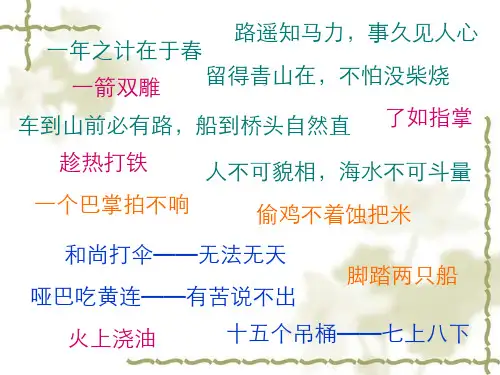
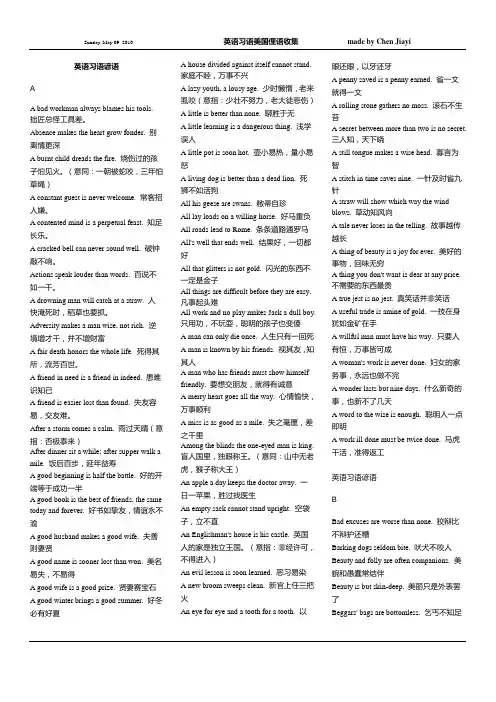
英语习语谚语AA bad workman always blames his tools. 拙匠总怪工具差。
Absence makes the heart grow fonder. 别离情更深A burnt child dreads the fire. 烧伤过的孩子怕见火。
(意同:一朝被蛇咬,三年怕草绳)A constant guest is never welcome. 常客招人嫌。
A contented mind is a perpetual feast. 知足长乐。
A cracked bell can never sound well. 破钟敲不响。
Actions speak louder than words. 百说不如一干。
A drowning man will catch at a straw. 人快淹死时,稻草也要抓。
Adversity makes a man wise, not rich. 逆境增才干,并不增财富A fair death honors the whole life. 死得其所,流芳百世。
A friend in need is a friend in indeed. 患难识知已A friend is easier lost than found. 失友容易,交友难。
After a storm comes a calm. 雨过天晴(意指:否极泰来)After dinner sit a while; after supper walk a mile. 饭后百步,延年益寿A good beginning is half the battle. 好的开端等于成功一半A good book is the best of friends, the same today and forever. 好书如挚友,情谊永不渝A good husband makes a good wife. 夫善则妻贤A good name is sooner lost than won. 美名易失,不易得A good wife is a good prize. 贤妻赛宝石A good winter brings a good summer. 好冬必有好夏A house divided against itself cannot stand.家庭不睦,万事不兴A lazy youth, a lousy age. 少时懒惰,老来虱咬(意指:少壮不努力,老大徒悲伤)A little is better than none. 聊胜于无A little learning is a dangerous thing. 浅学误人A little pot is soon hot. 壶小易热,量小易怒A living dog is better than a dead lion. 死狮不如活狗All his geese are swans. 敝帚自珍All lay loads on a willing horse. 好马重负All roads lead to Rome. 条条道路通罗马All's well that ends well. 结果好,一切都好All that glitters is not gold. 闪光的东西不一定是金子All things are difficult before they are easy.凡事起头难All work and no play makes Jack a dull boy.只用功,不玩耍,聪明的孩子也变傻A man can only die once. 人生只有一回死A man is known by his friends. 视其友,知其人A man who has friends must show himselffriendly. 要想交朋友,就得有诚意A merry heart goes all the way. 心情愉快,万事顺利A miss is as good as a mile. 失之毫厘,差之千里Among the blinds the one-eyed man is king.盲人国里,独眼称王。
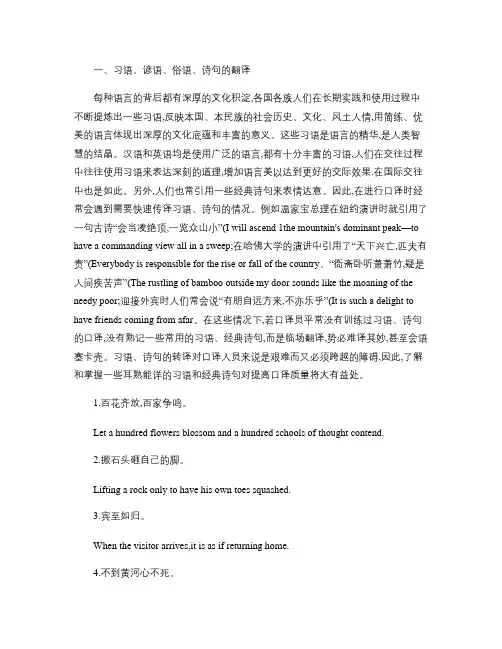
一、习语、谚语、俗语、诗句的翻译每种语言的背后都有深厚的文化积淀,各国各族人们在长期实践和使用过程中不断提炼出一些习语,反映本国、本民族的社会历史、文化、风土人情,用简练、优美的语言体现出深厚的文化底蕴和丰富的意义。
这些习语是语言的精华,是人类智慧的结晶。
汉语和英语均是使用广泛的语言,都有十分丰富的习语,人们在交往过程中往往使用习语来表达深刻的道理,增加语言美以达到更好的交际效果.在国际交往中也是如此。
另外,人们也常引用一些经典诗句来表情达意。
因此,在进行口译时经常会遇到需要快速传译习语、诗句的情况。
例如温家宝总理在纽约演讲时就引用了一句古诗“会当凌绝顶,一览众山小”(I will ascend 1the mountain's dominant peak—to have a commanding view all in a sweep;在哈佛大学的演讲中引用了“天下兴亡,匹夫有责”(Everybody is responsible for the rise or fall of the country、“衙斋卧听萧萧竹,疑是人间疾苦声”(The rustling of bamboo outside my d oor sounds like the moaning of the needy poor;迎接外宾时人们常会说“有朋自远方来,不亦乐乎”(It is such a delight to have friends coming from afar。
在这些情况下,若口译员平常没有训练过习语、诗句的口译,没有熟记一些常用的习语、经典诗句,而是临场翻译,势必难译其妙,甚至会语塞卡壳。
习语、诗句的转译对口译人员来说是艰难而又必须跨越的障碍,因此,了解和掌握一些耳熟能详的习语和经典诗句对提高口译质量将大有益处。
1.百花齐放,百家争鸣。
Let a hundred flowers blossom and a hundred schools of thought contend.2.搬石头砸自己的脚。
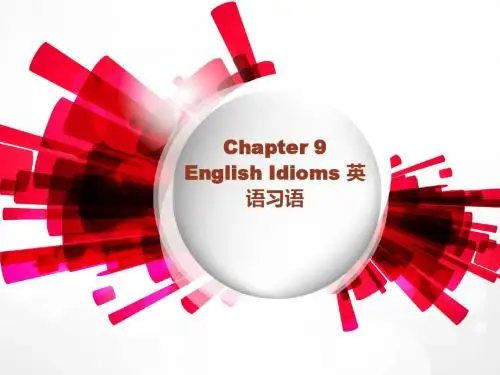
中考英语书面表达满分技巧英语习语(English idioms)DAY 001 a bird in the hand is better than two in the bush[翻译]一鸟在手胜于二鸟在林DAY 002 a black sheep[翻译]败家子害群之马DAY 003 a bolt from the blue[翻译]晴天霹雳出人意表DAY 004 a hot potato[翻译]烫手山芋,指处理困难或危险或棘手的事情DAY 005 a left-handed compliment[翻译]假意恭维DAY 006 a penny for your thoughts[翻译]询问他人在琢磨什么DAY 007 a piece of cake[翻译]小菜一碟,那就很容易做到DAY 008 a slap on the wrist[翻译]轻微的惩罚DAY 009 a snowball effect[翻译]滚雪球效应DAY 010 ace up one’s sleeve[翻译]手中握有王牌、解救危机的好办法DAY 011 actions speak louder than words[翻译]行动胜于雄辩DAY 012 add insult to injury[翻译]雪上加霜DAY 013 against the clock[翻译]争分夺秒DAY 014 an arm and a leg[翻译]形容很富有DAY 015 at sea[翻译]不知所措或混乱的状态DAY 016 at the drop of a hat[翻译]立即地毫不犹豫DAY 017 back against the wall [翻译]陷入困境无处可逃DAY 018 back to square one[翻译]重起炉灶DAY 019 back to the drawing board[翻译](失败后)重新开始,从头再来DAY 020 ball is in your court[翻译]掌握发言权,由你决定DAY 021 barking up the wrong tree[翻译]捕风捉影,主要是指把精力花在了不该花的地方,搞错了目标DAY 022 be glad to see the back of[翻译]庆幸终于摆脱(某人或某物)DAY 023 be in a tight corner.[翻译]处于困难的境地DAY 024 bear a grudge[翻译]含怨DAY 025 beat around the bush[翻译]拐弯抹角DAY 026 behind one’s back[翻译]背着某人DAY 027 beside yourself with joy[翻译]特别开心DAY 028 best of both the worlds[翻译]两全其美DAY 029 best thing since sliced bread [翻译]有史以来最好的事情DAY 030 better late than never[翻译]迟做总比不做好DAY 031 bide one's time[翻译]等待时机DAY 032 big cheese[翻译]大人物,要人DAY 033 bite off more than you can chew [翻译]贪多嚼不烂DAY 034 bite the bullet[翻译]硬着头皮做咬紧牙关应付DAY 035 black and blue[翻译]青一块紫一块DAY 036 black out[翻译]晕厥暂时昏迷DAY 037 blessing in disguise[翻译]塞翁失马,焉知非福DAY 038 blow hot and cold[翻译]反复无常DAY 039 blow off steam[翻译]发泄情绪,宣泄不满DAY 040 boil the ocean[翻译]尝试艰难或不可能的任务DAY 041 bounce something off someone [翻译]征求某人的意见DAY 042 break a leg[翻译]祝你好运DAY 043 break fresh/ new ground[翻译]开辟新天地DAY 044 break the bank[翻译]斥巨资倾家荡产DAY 045 burn the midnight oil[翻译]熬夜DAY 046 burn your boats/bridges[翻译]不留后路,下定决心干到底”,破釜沉舟DAY 047 bury the hatchet[翻译]化干戈为玉帛DAY 048 by the skin of your teeth[翻译]侥幸,勉强DAY 049 call a de a de[翻译]直接了当,直言不讳DAY 050 call it aDAY[翻译]到此为止结束DAY 051 caught between two stools[翻译]两边不讨好DAY 052 chip off the old block[翻译](相貌或性格)酷似父亲或母亲的人DAY 053 cross that bridge when you come to it[翻译]船到桥头自然直DAY 054 cry for the moon[翻译]异想天开海底捞月DAY 055 cry over spilled milk[翻译]覆水难收DAY 056 crying wolf[翻译]假意求救DAY 057 curiosity killed the cat[翻译]好奇心往往很危险DAY 058 cut corners[翻译]偷工减料DAY 059 cut no ice[翻译](对某人)没有影响、不起作用,说服不了(某人)DAY 060 cut the mustard[翻译]符合要求(或条件) 达到标准,正常运转IDAY 061 cut to the chase[翻译]抓住核心抓住要害DAY 062 devil’s advocate[翻译]故意唱反调的人DAY 063 do unto others as you would have them do unto you[翻译]己所不欲,勿施于人DAY 064 don’t count your chickens before the eggs have hatched[翻译]不要过早乐观,过早地打如意算盘DAY 065 don’t give up theDAY job[翻译]做好眼下的工作(让某人不要追求不可能成功的事情)DAY 066 don’t judge a book by its cover [翻译]勿以貌取人DAY 067 don’t put all your eggs in one basket[翻译]不要把所有的鸡蛋都放在一个篮子里DAY 068 down for the count[翻译]彻底失败DAY 069 drastic times call for drastic measures[翻译]非常时期采用非常手段DAY 070 draw first blood[翻译]先下手为强DAY 071 easier said than done[翻译]说起来容易做起来难DAY 072 eat like a horse[翻译]狼吞虎咽DAY 073 egg on your face[翻译]困窘不堪DAY 074 eleventh hour[翻译]最后时刻,刚好来得及DAY 075 elvis has left the building[翻译]不用再等了”或者“已经毫无悬念了”DAY 076 every cloud has a silver lining [翻译]天无绝人之路DAY 077 face the music[翻译]承担自己行为的后果接受批评(或惩罚)DAY 078 fair and square[翻译]光明正大地诚实地DAY 079 far cry from[翻译]............大相径庭DAY 080 feel a bit under the weather [翻译]感觉有点不舒服DAY 081 fish out of water[翻译]走出你的舒适区DAY 082 flesh and blood[翻译]血肉之躯DAY 083 forty winks[翻译]打盹,小睡,午睡DAY 084 get in shape[翻译]强健身体DAY 085 get your act together[翻译]有条理地行事合理安排DAY 086 give it a whirl[翻译]试一试DAY 087 give the benefit of doubt[翻译]姑且信(某人说的话)DAY 088 go back to the drawing board [翻译]从头做起DAY 089 go cold turkey[翻译]突然停止DAY 090 go the extra mile [翻译]加倍努力加把劲DAY 091 good things come to those who wait[翻译]苍天不负苦心人DAY 092 has bigger fish to fry[翻译]有更重要的事情要做DAY 093 have the blues[翻译]郁郁不乐DAY 094 have your heart in your mouth [翻译]心都提到嗓子眼了,形容非常紧张DAY 095 hear through the grapevine[翻译]道听途说DAY 096 heart misses (skips) a beat[翻译]脸红心跳,形容非常兴奋或紧张DAY 097 hit the books[翻译]好好读书DAY 098 hit the nail on the head[翻译]一针见血DAY 099 hit the sack/sheets/hay[翻译]去睡觉DAY 100 hook, line and sinker[翻译]以彻底和热情做某事或试图实现某事DAY 101 ignorance is bliss[翻译]难得糊涂DAY 102 in for a penny, in for a pound [翻译]一不做,二不休DAY 103 in the fast lane[翻译]紧张而刺激的生活DAY 104 in the heat of the moment[翻译]盛怒之下,一时激动DAY 105 in the same boat[翻译]同病相怜DAY 106 it is always darkest before the dawn[翻译]黎明前总是最黑的,事情会变得更好DAY 107 it takes two to tango[翻译]一个巴掌拍不响DAY 108 jam on the brakes[翻译]猛地刹车DAY 109 jump on the bandwagon[翻译]站在某人一边一窝蜂做某事DAY 110 jump the gun[翻译]抢先行动过早地行动DAY 111 keep an ear to the ground[翻译]密切注意舆论动向注意人们想的和说的DAY 112 keep something at bay[翻译]控制住,牵制DAY 113 kill the goose that lays the golden eggs[翻译]杀鸡取卵DAY 114 kill two birds with one stone [翻译]一石二鸟DAY 115 last straw[翻译]最后一根稻草DAY 116 left out in the cold[翻译]遭受冷落DAY 117 let sleeping dogs lie[翻译]别惹麻烦别多事DAY 118 let the cat out of the bag[翻译](无意中)泄露秘密说漏嘴DAY 119 light at the end of tunnel[翻译]苦尽甘来、柳暗花明的迹象DAY 120 like a cakewalk[翻译]如此轻松的任务DAY 121 like a cat on hot tin roof[翻译]热锅上的蚂蚁DAY 122 look before you leap[翻译]三思而后行DAY 123 looking to your laurels[翻译]小心翼翼地保持已得的荣誉DAY 124 lose your marbles[翻译]发疯DAY 125 make a long story short[翻译]长话短说DAY 126 make one’s blood boil[翻译]使某人非常生气DAY 127 method in the madness[翻译]装疯卖傻不合常理的方法DAY 128 miss the boat[翻译]错失良机DAY 129 not a rk of decency [翻译]不体面DAY 130 not playing with the full deck [翻译]精神上、心理上或智力上有缺陷的人DAY 131 not the only fish in the sea[翻译]天涯何处无芳草DAY 132 not your cup of tea[翻译]不关你的事DAY 133 notch up[翻译]赢得达到DAY 134 off the cuff[翻译]即兴表演DAY 135 off the record[翻译]不公开DAY 136 old as the hills[翻译]古老的DAY 137 old habits die hard[翻译]旧习难改DAY 138 oldest trick in the book[翻译]最常用来欺骗别人的把戏或方法DAY 139 on cloud nine[翻译]异常兴奋乐不可支DAY 140 on the ball[翻译]敏锐的,机警的DAY 141 once bitten, twice shy[翻译]一朝被蛇咬十年怕井绳DAY 142 once in a blue moon[翻译]千载难逢百年不遇DAY 143 open the floodgates[翻译]一发不可收拾DAY 144 out of the blue[翻译]出乎意料DAY 145 out on a limb[翻译]孤立无助陷入绝境DAY 146 over my dead body[翻译]除非我死了,否则休想”(表示强烈反对) DAY 147 over the top[翻译]夸张的言过其实的DAY 148 palm off[翻译]骗卖DAY 149 pen is mightier than the sword [翻译]笔墨胜过刀剑DAY 150 penny wise and pound foolish [翻译]小事聪明,大事糊涂DAY 151 play by the ear[翻译]即兴发挥DAY 152 play devil’s advocate[翻译]唱反调DAY 153 play your cards right[翻译]办事高明,处理得当DAY 154 pour out one’s heart[翻译]倾诉衷肠DAY 155 push one’s luck[翻译]得寸进尺DAY 156 put something on ice[翻译]推迟,搁置某件事情DAY 157 rain on someone’s parade[翻译]破坏原定的计划DAY 158 raining cats and dogs[翻译]下大雨DAY 159 read between the lines[翻译]字里行间了解事物背后的真实信息DAY 160 reap the harvest[翻译]收获硕果DAY 161 right off the bat[翻译]马上立刻DAY 162 ring a bell[翻译]听起来很熟悉DAY 163 roll up one’s sleeves[翻译]撸起袖子加油干DAY 164 round the bend[翻译]做蠢事DAY 165 run around in circles[翻译]白费功夫DAY 166 scrape the barrel[翻译](因别无选择)将就,凑合”DAY 167 see eye to eye[翻译]意见一致DAY 168 sell like hot cakes[翻译]热销DAY 169 shoot from the hip[翻译]鲁莽行事DAY 170 shoot oneself in the foot [翻译]咎由自取,搬起石头砸自己的脚DAY 171 shot in the dark[翻译]无根据的瞎猜DAY 172 sink your teeth into[翻译]全神贯注,决心解决DAY 173 skating on thin ice[翻译]如履薄冰DAY 174 snug as a bug in a rug[翻译]非常舒适DAY 175 stab someone in the back[翻译]暗箭伤人DAY 176 stand in a good stead[翻译]对某人很有用DAY 177 step up your game[翻译]开始表现更好DAY 178 straight from the horse’s mouth[翻译]绝对可靠DAY 179 strike while the iron is hot [翻译]趁热打铁DAY 180 swan song[翻译]绝唱DAY 181 take a back seat[翻译]退居次要位置DAY 182 take a nosedive[翻译]急转直下DAY 183 take a rain check[翻译]推迟计划DAY 184 take it with a grain of salt [翻译]半信半疑DAY 185 take the plunge[翻译]决心行动DAY 186 taste of one’s own medicine [翻译]自食其果DAY 187 the best thing since sliced bread[翻译]最好的东西DAY 188 the pot calling the kettle black [翻译]五十步笑百步DAY 189 the whole nine yards[翻译]一切全部DAY 190 think the world of[翻译]非常喜欢DAY 191 through thick and thin[翻译]风雨同舟DAY 192 throw caution to the wind[翻译]不顾一切地做某事DAY 193 tight spot[翻译]千钧一发DAY 194 to be in the doldrums[翻译]了无生气,无精打采DAY 195 to bell the cat[翻译]老虎头上捉虱子DAY 196 to have sticky fingers[翻译]贼DAY 197 to not see the wood for the trees[翻译]只见树木不见森林DAY 198 tongue in cheek[翻译]口是心非DAY 199 turn a blind eye[翻译]视而不见DAY 200 turn a deaf ear[翻译]充耳不闻DAY 201 twist someone’s arm[翻译]指给某人施加压力,迫使他做你要他做的事DAY 202 up a creek without a paddle[翻译]处于困境DAY 203 up for grabs[翻译]可能得到的DAY 204 up in arms[翻译]愤怒竭力反对DAY 205 walk on eggshells[翻译]小心翼翼DAY 206 want someone’s head on a platter[翻译]想严惩某人DAY 207 watch (someone) like a hawk[翻译]密切监视某人盯着某人DAY 208 water under the bridge[翻译]不可改变的既成事实DAY 209 wave a dead chicken[翻译]做一些无用、无用的事情,希望它能解决问题DAY 210 weak in the knees[翻译]因情绪、恐惧或疾病而几乎无法站立DAY 211 wear many hats[翻译]身兼数职DAY 212 wear your heart on your sleeve [翻译]感情外露DAY 213 weather the storm[翻译]成功度过一段艰难的时期DAY 214 wet behind the ears[翻译]乳臭未干的DAY 215 whale of a time[翻译]享受很多DAY 216 whistle in the dark[翻译]假装沉着给自已壮胆DAY 217 why keep a dog and bark for yourself[翻译]既然花钱雇人,为何还亲自动手DAY 218 wide off the mark[翻译]远离目标DAY 219 wild goose chase[翻译](根据错误信息进行的)徒劳寻找,徒劳之举DAY 220 wipe the slate clean[翻译]一笔勾销既往不咎DAY 221 wolf in sheep’s clothing[翻译]披着羊皮的狼DAY 222 work your fingers to the bone [翻译]拼命工作DAY 223 worm’s eye view[翻译]最下层的看法DAY 224 worth one’s salt[翻译]称职DAY 225 wrap one’s brain around[翻译]绞尽脑汁DAY 226 you can say that again[翻译]这是绝对正确的DAY 227 your guess is as good as mine [翻译]我跟你一样也不知道DAY 228 zero in on something[翻译]专注于某事。
On Idioms and Their Translation from Chinese into English习语及习语的汉英翻译AbstractIdioms are just like incomparably resplendent bight pearls emitting dazzling rays in the palace of literature. Throughout the ages, they animate the works of countless men of literature and writing. Idioms have fixed patterns and abundant connotations. Their vivid images explicitly convey incisive meanings. Chinese idioms are part of the essence of Chinese culture with a history of thousands of years. In this thesis, the English translation of Chinese idioms will be discussed on the foundation of simply introducing the definitions, origins, features, and classifications of idioms, and a series of principles and methods of idiom translation will be put forward, mainly involving the translation of the Chinese idioms which have similar and dissimilar implications in English.Key words:Chinese Idioms;Similarity;Dissimilarity摘要习语犹如文学殿堂里一颗璀璨无比的明珠放射着历久不衰的光芒,古往今来,无数文人墨客的笔下都闪耀着它的异彩。
1
Assignments:
I. 试译下列各句:
1. Diligence is the mother of good fortune.
2. There is only one me in this world.
3. I’m on the top of the world.
4. Wisdom is a good purchase though we pay dear for it.
5. Doubt is the key of knowledge.
6. To him that does everything in its proper time, one day is worth three.
7. I’m not talking about castles in the air —— the donkey’s carrot. No, I mean something we’ve
all shared.
8. Men may meet but mountains never.
II.试译下列各句,运用汉语习语翻译斜体部分:
1. In a dangerous and uncertain world, the strengthening of national defence is the best guarantee
of a nation’s vital interests.
2. His body was perfect, alive with easy suppleness and health and strength.
3. But far from recovering, that county remained overwhelmed by corruption, a tottering
bureaucracy, surging prices and natural disasters.
III. Put the following sentences into Chinese:
一、试译下列各句,把作独立成分用的英语拟声词译成作独立成分用的汉语拟声词:
1. Crack! The stick broke in two.
2. Plop, plop… there was water dripping from the ceiling onto the earth
floor.
3. Crash! The door was broken.
4. Thwack! Thwack! Thwack! This was the first humiliation of his life.
5. Splish! Splish! The water bubbled round his legs.
二、试译下列各句,将英语拟声动词、名词或动词派生词转变为汉语动词拟声附加语或名
词拟声附加语:
1. He let the beer gurgle down his throat.
2. All the time there were clucks of admiration from the crowd.
3. A crystal tear-drop plopped down on to the letter.
4. The young man slapped three silver dollars on the counter.
5. The low whirr of the spinning wheel spoke to him of the warmth of
home and his mother’s love.
6. She wore a pair of black leather shoes that clicked against the asphalt
as she walked along.
三、试译下列各句,将英语拟声动词或动词派生词译成汉语拟声动词:
1. All you could do is keep on clack-clack-clacking.
2. Those standing behind whispered and chattered all the time.
2
四、试译下列各句,将英语拟声词译成汉语非拟声词:
1. The old man banged the boy’s head against the wall.
2. She thumps her chest as if she feels pain there.
3. They splashed through the mire to the village.
4. Already some horse-drawn carts were creaking along the street.
五、试译下列各短语,将英语拟声词译成汉语非拟声词:
1. the rataplan of the drum 鼓的咚咚声
2. the clangour of the gong 锣的锵锵声
3. the clanging of the tram 电车叮叮当当的声音
4. the bumping of the van
5. the rumbling of the truck 卡车的隆隆声
6. the jangling of the bicycle 单车的叮铃叮铃声
7. the tick-tack of the watch 钟的滴答滴答声
六、试译下列各短语,将英语拟声词译成汉语非拟声词:
1. the neighing of the horse 马嘶
2. the quacking of the duck 鸭的嘎嘎声
3. the crowing of the cock 公鸡的啼叫
4. the bleating of the sheep 羊的咩咩叫
5. the heehawing of the donkey 驴叫
6. the baaing of the calf 小羊的咩咩叫
七、试译下列各句,在译文中加用汉语拟声词:
1. The tears she could not hold back fell on his face.
2. Noisily, the crowd swarmed out of the door.
3. He sat there gnawing the biscuit.
4. The logs were burning briskly in the fire.
5. There were no sounds but that of the tread of the men and the footsteps of the two shaggy
ponies which drew the van.